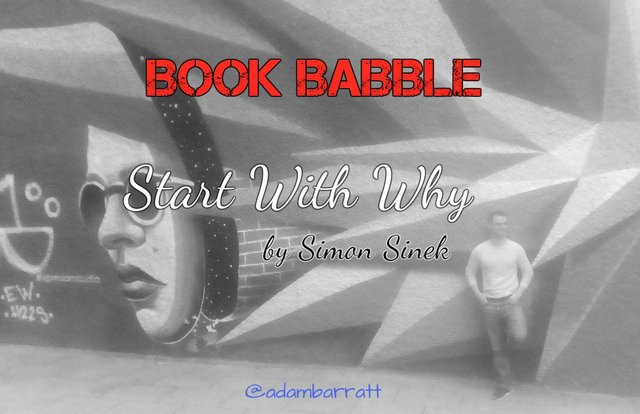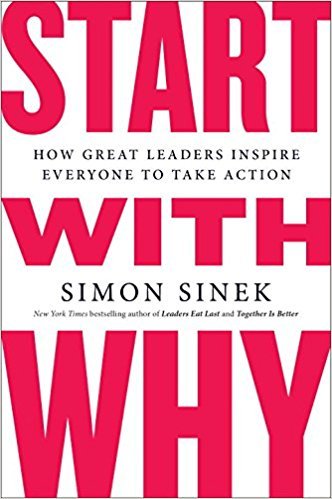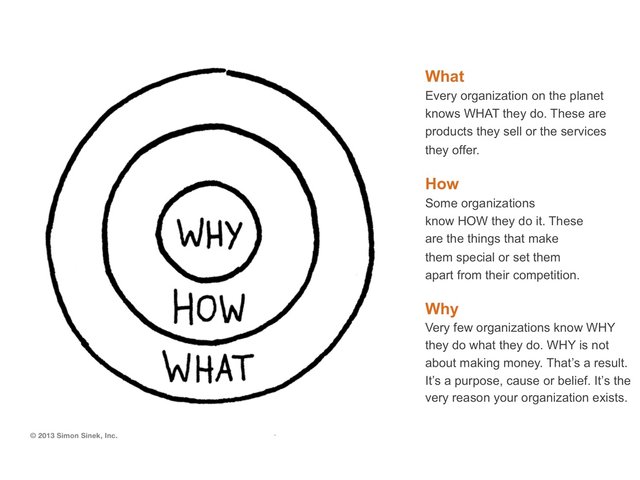People don’t buy WHAT you do, they buy WHY you do it!

That's a classic line above - if you don't have that drummed in to your head after reading and listening to this guy, I don't know what will!
The author is Mr Simon Sinek and today we discuss his popular business book Start With Why.
You may well be familiar with his TED Talk which is one of the most viewed of all time and the book delves much deeper. Both are based around his Golden Circle concept, the central premise being: starting with a strong why, whether it be in business or in your personal life, then work on the how and what, rather than the other way round.
It's a juicy one I've read twice and I do believe it's worth a look for all.
Sinek is an interesting character. He's not to everyone's taste but he could be considered a 'thought leader' (whatever that means ;)). He's authored a few books now including a recent one called Find Your Why (which may we worth a read as presumably it will tie in well with this one), as well as Leaders Eat Last. He's also a speaker and marketing consultant.
You may have also seen him on a video that went viral not too long ago on 'millennials'. I'm not a fan of these labels (the overall tag but also the associated implications) but I do recognise it's a way for people to categorise and make sense of the world. I'll drop a YouTube link at the end for you to have a look should you wish and feel free to comment.
But for now, on with the book!

Image courtesy of Amazon.com
Simon says? Here are some great quotes from the book along with my additional thoughts…
There are leaders and there are those who lead. Leaders hold a position of power or influence. Those who lead inspire us.
It's not just about being 'the boss'. It's about setting an example and inspiring those all around you for greater things.
WHY: Very few people or companies can clearly articulate WHY they do WHAT they do. When I say WHY, I don’t mean to make money—that’s a result. By WHY I mean what is your purpose, cause or belief? WHY does your company exist? WHY do you get out of bed every morning? And WHY should anyone care?
The nuts and bolts. Why is essentially your motivation, that underlying reason and energy for movement.
Their products give life to their cause.
Sinek discusses a few main people and companies in the book to use as examples. One of them was Apple, that he spoke a lot about. In all cases, the above was true: it wasn't so much about the end product (as great as that could be) but the 'cause' beneath it all. Those end products then gave a life to said cause.
The problem was, they advertised their product as a “5GB mp3 player.” It is exactly the same message as Apple’s “1,000 songs in your pocket.” The difference is Creative told us WHAT their product was and Apple told us WHY we needed it.
No-one is really driven by features. Sure, they are important and have their place, but it's the emotions, benefits and outcomes that people buy in to. What on earth does '5GB' mean to most people? Nada. '1000 songs in your pocket' is descriptive and exciting, especially when it's a fairly new concept.
It is not a computer company, but a company that challenges the status quo and offers individuals simpler alternatives.
Apple were and are all about thinking differently. Challenging the status quo. They happen to make computers as an extension of that core belief.
Henry Ford summed it up best. “If I had asked people what they wanted,” he said, “they would have said a faster horse.”
This is an interesting one. People advise to ask prospects what they want and then give it to them. Sounds great, but people don't generally know what they want, or what's even possible. You have to tell them if you have the vision. The point above, is that there's no way the general populace would be asking for cars, they had no idea about the technology. They would have asked for advancements in the horse and carriage.
This applies to all technology and visionary movement. Blockchain and Crypto, anyone? ;)
if a company mistreats their people, just watch how the employees treat their customers.
The customer isn't the number one priority. It's the staff. Happy staff will naturally be better with customers and make a better experience for all. Unhappy employees and environment… and it's a potential shit storm.
you can’t have a good product without people who like coming to work.
People need to enjoy their work. Period. I don't mean every single second and every task, but a general joy for what they're producing and contributing to. Products are secondary. In fact, the people involved are very much part of the product or service. It's one organism, not separate entities.
You have to talk about your WHY and prove it with WHAT you do. Again, a WHY is just a belief, HOWs are the actions we take to realize that belief, and WHATs are the results of those actions. When all three are in balance, trust is built and value is perceived.
A few more mechanics of the triple whammy.

The Golden Circle. Image courtesy of blankcanvas.io and Simon Sinek, Inc.
Cultures are groups of people who come together around a common set of values and beliefs. When we share values and beliefs with others, we form trust.
Basics of community and human behaviour. Applies to business as well, surprise surprise.
“Men wanted for Hazardous journey. Small wages, bitter cold, long months of complete darkness, constant danger, safe return doubtful. Honour and recognition in case of success.”
Reference to an ad in a newspaper for recruits to join the adventurer Ernest Shackleton on an expedition to Antarctica. Doesn't sound too promising, but a fine example of people joining you on a quest if they believe what you believe. The only people who applied were true warriors who this spoke to.
they won’t be working hard and looking for innovative solutions for you, they will be doing it for themselves.
Follows on from above. It's not about blindly following the leader in his/her endeavour. People show up for themselves and their beliefs, which are aligned.
Herb Kelleher famously said, “You don’t hire for skills, you hire for attitude. You can always teach skills.”
Ahh, yes Herb. Attitude is King. Most skills are teachable with a diligent student. Attitude isn't and can only be adapted through a change in the individual.
Great companies don’t hire skilled people and motivate them, they hire already motivated people and inspire them.
Again, skills are secondary and teachable. It's great to have them but you need to learn them at some point anyway, no-one springs from the womb fully equipped. Motivating people is hard and usually not sustained. If people are already motivated, then it's just a case of inspiring which will lift their game to the stratosphere!
The role of a leader is not to come up with all the great ideas. The role of a leader is to create an environment in which great ideas can happen.
A leader creates a nurturing environment. A hotbed of activity where great ideas can fly abundantly. A leader's success comes not in the number of followers but in the number of leaders they create.
Some in management positions operate as if they are in a tree of monkeys. They make sure that everyone at the top of the tree looking down sees only smiles. But all too often, those at the bottom looking up see only asses.
Bloody monkeys.
Passion comes from feeling like you are a part of something that you believe in, something bigger than yourself.
That elusive and sought after 'passion'. Being part of something amazing and knowing your place in it.
“employees come first and if employees are treated right, they treat the outside world right, the outside world uses the company’s product again, and that makes the shareholders happy.
This goes back to the treatment and feeling of employees. Super important.
it is nearly impossible to “convince” someone of the value of your products or ideas based on rational arguments and tangible benefits.
Emotion first. Logic second.
loyalty is when people are willing to suffer some inconvenience or pay a premium to do business with you.
Standing in line for hours, for example, just to be the first to get a slightly newer piece of plastic… which may or may not be better than the one before and you could pick up later easily anyway. You have something that they want. And it's far bigger than the actual piece of plastic.
The goal of business then should not be to simply sell to anyone who wants what you have—the majority—but rather to find people who believe what you believe,
Yeah, don't be all things to all people. Terrible business model (and life model for that matter). Find your people.
they suffered the inconvenience willingly, not because they were in the market for a motorcycle, but because they wanted a Harley.
Harley Davidson was another company referenced. I hesitate to call them a 'company' as they are so much more. They represent an idea, a brand, a certain type of person. It's not about the bike, it's about owning a Harley!
Your role in the process is to be crystal clear about what purpose, cause or belief you exist to champion, and to show how your products and services help advance that cause.
Know who you are and what you do. What you offer and what you represent. Then proceed to show how your offerings can bring that to fruition.
Energy Excites. Charisma Inspires.
Sinek makes the comparison of former CEO of Microsoft Steve Ballmer and its Founder Bill Gates. Ballmer is notorious for getting the crowd going and pumped. Not really a Gates trait. The trouble is that energy can (and usually does) dissipate after the event is over. It all drops back to a normal level. Gates has a certain charisma and knowledge of his craft. He's not a great speaker, a little awkward, socially outcast even… but when he talks, you listen. You lean in. Perhaps get inspired, especially if you're in to that space.
There's nothing wrong with energy, it is great and has its place. It can be a little fake sometimes and is often short-lived. Charisma breeds inspiration… and inspiration helps to pull you, even without any so-called energy. Motivation is more about the push, and needs something added to bring about any change.
Charisma has nothing to do with energy; it comes from a clarity of WHY.
Ties in with above. Deep knowledge and being clear on your purpose and on who you (and/or your business) are.
We don’t want to come to work to build a wall, we want to come to work to build a cathedral.
The greater vision. Concentrate on the brick when doing the work, but always keep in mind the cathedral you are building.
to inspire people to do the things that inspire them
Simon Sinek's central Why.
They reminisced about the days when they didn’t have any money and were working out of their basements, trying to get things going. They longed for the feeling they used to have.
This is talking about successful entrepreneurs and the like who have 'made it'. There's almost a wistful regret, that those days of the grind and hustle are gone. Sure, they appreciate what they have and what they have worked so hard for… but there was something about those early days: the hope, uncertainty, building something, crazy stories etc.
I imagine we also look at things through rose tinted lenses. That is to say, we can all have a good laugh 20 years later about sleeping in a garage, eating noodles but it may not have been much fun at the time. Although there may have been something 'romantic' about it all. The hero's journey. When you're at the top, where do you go? What do you strive for?
There was a sitcom in the UK called Only Fools and Horses. It was based around a couple of brothers trying to make it big but were ultimately small time 'geezers' selling dodgy gear at market around London. They always longed to be millionaires (especially the older brother who had delusions of grandeur). Anyway, in one series they found an antique watch and sold it for millions at auction. After a little bit of joy, they felt like crap because they had nothing to play for. I can't remember how it turned out, but they probably lost it all. Hilarious show and very 'British', but I digress…
Something to think about. We definitely do want to make it to the top. But enjoy each stage of the journey. There is something to be said for each. And whilst we're at it, appreciate what people go through to get to where they are or are heading to.
achievement comes when you pursue and attain WHAT you want. Success comes when you are clear in pursuit of WHY you want it.
Absolutely. Achievement is fleeting (great, but temporary). Success is making progress on your core pursuit(s).
Thanks Simon! Anything else?
I'll post his famous TED Talk here too for ease of reference and you can take a look at what I'm talking about. He has other talks and speeches out there if you wish to delve further…
And here's that millennial interview, with Tom Bilyeu on his show Inside Quest:
As an aside, I found there's a term for 'my era'. I was born at the end of 1980 and the term is Xennials - those born between Gen X and Millenials, approx 1977 to 1983. Who knew! Great, we now have a box! ;)
What do you make of it all? The book, Sinek… or millenials?? And what is your WHY?
~ Adam
@adambarratt
Related:
~ Original #BookBabble post
~ Think Like Da Vinci; End of Jobs; The One Thing; Eat, Move, Sleep
1. Shoe Dog by Phil Knight
2. Crushing It by Gary Vaynerchuk
3. Finding Ultra by Rich Roll
4. Wooden by John Wooden
5. Relentless by Tim Grover
6. On Writing by Stephen King
8. The Chimp Paradox by Steve Peters
9. Elon Musk by Ashlee Vance
*****
- Creative Director & Copywriter
@ FortressFree.com - Instagram: adam.barratt
- Twitter: adambarratt
- Facebook: FortressFree
- LinkedIn: /in/adambarratt
This post was upvoted by the Steemit Book Project! The project exists to help make books more available to the world and to promote book-related content on Steemit.
You can read more about the project here. If you write book related posts, head over to our Discord server (https://discord.gg/h93nHMu) and pop your book post links in the #curation-requests channel.
Hope you have a wonderful and bookfull day!
Downvoting a post can decrease pending rewards and make it less visible. Common reasons:
Submit
This is simply wonderful. Finding the whys associated with what you want to do is precisely what helps you build compellign reasons to follow through with a goal. So the what does not matter much but the why does because if the why is strong enough, it will drive you to accomplish the what even if it is completely bizarre and seems impossible. Resteeming it and featuring it in my curation post. :)
Downvoting a post can decrease pending rewards and make it less visible. Common reasons:
Submit
Thanks Shary! Exactly, that's about the size of it. The why being the central fire that all else builds from… the what being an effect or expression. Glad you liked it and thanks for the feature! :)
Downvoting a post can decrease pending rewards and make it less visible. Common reasons:
Submit
Honestly if you find even one compelling enough why, you stop feeling demotivated about pursuing your goal.
Downvoting a post can decrease pending rewards and make it less visible. Common reasons:
Submit
Congratulations! This post has been chosen as one of the daily Whistle Stops for The STEEM Engine!
You can see your post's place along the track here: The Daily Whistle Stops, Issue # 63 (3/4/18)
The STEEM Engine is an initiative dedicated to promoting meaningful engagement across Steemit. Find out more about us and join us today!
Downvoting a post can decrease pending rewards and make it less visible. Common reasons:
Submit
Cheers!
Downvoting a post can decrease pending rewards and make it less visible. Common reasons:
Submit
One of my favorite business books. Thx for the article.
Downvoting a post can decrease pending rewards and make it less visible. Common reasons:
Submit